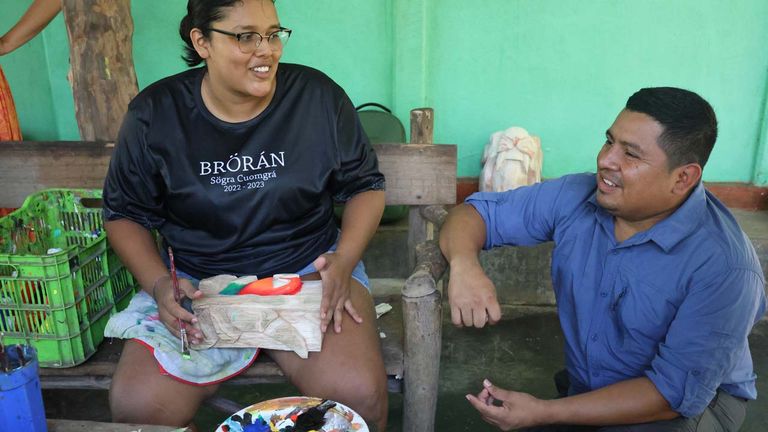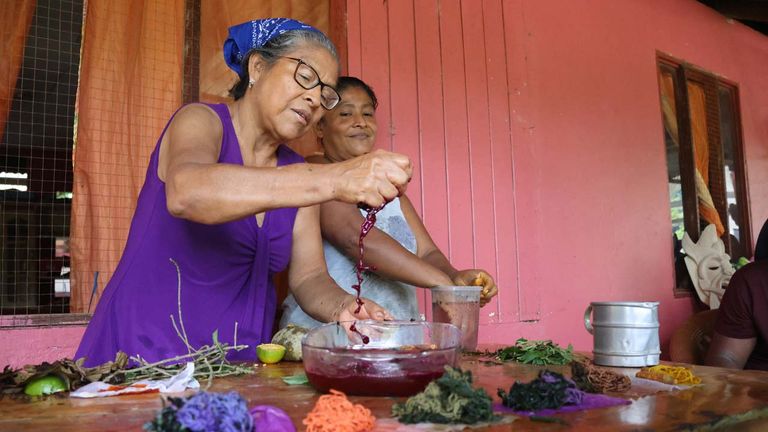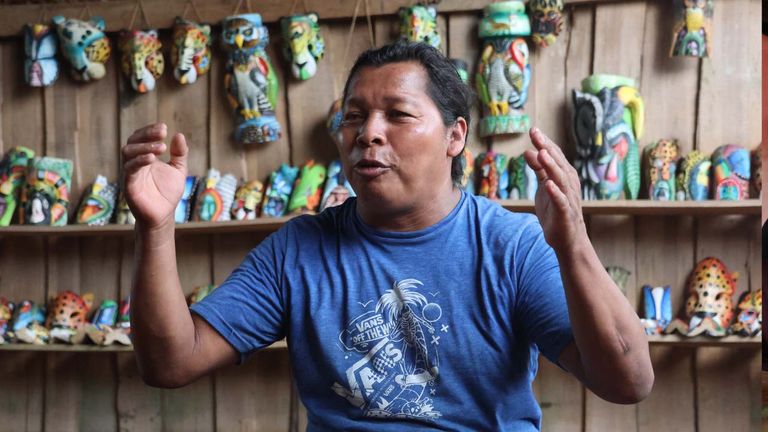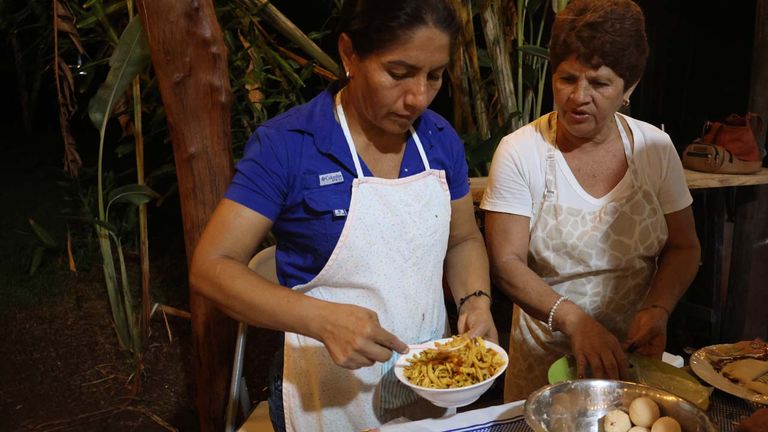Caroline Villanueva adjusted my chisel to the correct angle and motioned to me to use my mallet. A mask maker of the Indigenous Terraba community of Costa Rica, Villanueva had outlined a picture of a toucan — a beloved Costa Rican bird — on a piece of wood, and I was learning how to carve it into a ceremonial mask while on a cultural tour of the country with Intrepid Travel.
About an hour later, thanks to her fixing my mistakes, we progressed to the next step: painting the toucan with bright yellow, red and green hues. Villanueva, who learned the craft from her father, explained to me that the masks are part of the Terraba culture and commonly used for holidays and festivals.
 Caroline Villanueva is a mask maker and member of the Indigeous Terraba community.
Caroline Villanueva is a mask maker and member of the Indigeous Terraba community.
Credit: 2023 Lina Zeldovich
Most people travel to Costa Rica to see its unique wildlife, but the Central American country is also home to eight Indigenous peoples who make up 24 different communities. Each community has its own history, language, culture and art, which residents are happy to share with everyone. Worldwide, there has been a growing appreciation for the way Indigenous people live in harmony with the land, taking only what’s needed and preserving the rest, and Intrepid is keen on this subject. The tour operator offers visits to Indigenous communities across Costa Rica, in an effort to educate travelers about the joys that can be gleaned from their ways of life.
"It comes from the ethos that we have as a company — to ensure that we connect with the local people in the places we take our customers to,” said Sara King, general manager of purpose for Intrepid, whose work involves creating positive environmental and social impact.
Authentically connecting tourists with local culture is particularly relevant in Costa Rica, which has a long-standing and vibrant Indigenous history.
“I think you just can't go to those places without engaging with Indigenous people, because they are central to the country’s landscape and history,” King said.
The Terraba People
Several of Intrepid’s itineraries now include visits to Indigenous communities. My mask-carving lesson, for example, was part of the eight-day Best of Costa Rica trip, which visits the Terraba people who have survived off the land for more than 500 years. Among other things, they've particularly mastered the art of roasting and brewing cacao, which they still enjoy in the traditional way — without sugar.
Prior to our mask-making lessons, we took part in the process, too, first roasting and then stone-grinding the fragrant cacao beans. As we savored the drink in its original sugarless form, we learned that the Terraba people consider themselves matriarchal, viewing women as teachers who are responsible for passing traditions down through generations.
 Luiza Leiva and Maria Lazaro show travelers how to make dyes from plants and leaves.
Luiza Leiva and Maria Lazaro show travelers how to make dyes from plants and leaves.
Credit: 2023 Lina ZeldovichAfter mask-making, we made a stop at a cultural center, where community members Luiza Leiva and Maria Lazaro demonstrated how they make natural dyes from plants and leaves, which they use to create colorful textiles such as woven blankets and rugs.
As they soaked and rubbed the cuttings, we watched as the different plants — originally of the same green color — yielded a rainbow of vibrant shades, ranging from bright red and deep purple to electric blue. (Insider tip: This demonstration is available upon request, so clients must inform the tour operator in advance if they would like to see it.) In 2024, Intrepid plans to add a new family trip that will also visit the Terraba people.
The Maleku People
Meanwhile, the 15-day Classic Costa Rica itinerary offers travelers a chance to meet and spend time with the cultural leaders of the Indigenous Maleku community, as well as plant a tree to restore their degraded forests.
Once a thriving society, the Maleku people were trafficked, enslaved, displaced and nearly decimated in the late 1800s by Nicaraguan rubber barons. Their lush forests were destroyed and turned into farmlands, and at the same time, Catholic missionaries began to Westernize their culture. Today, the Maleku have managed to replant and restore some of their forests, as well as revive their language — achievements they share proudly with guests.
 Eliaz Elizondo Castro, the Maleku’s cultural leader
Eliaz Elizondo Castro, the Maleku’s cultural leader
Credit: 2023 Lina Zeldovich“We are happy that we can now speak about and celebrate our traditions,” said Eliaz Elizondo Castro, the Maleku’s cultural leader.
The Juanilama Agricultural Community
Another Intrepid itinerary that connects clients with local populations is Costa Rica Family Holiday. The 10-day tour brings visitors to the Juanilama agricultural community nestled within the dense rainforest. Although not an Indigenous group, the Juanilama people live off the land, which was given to them as part of the government’s project to reduce poverty and create self-reliance.
 The Juanilama agricultural community live off the land.
The Juanilama agricultural community live off the land.
Credit: 2023 Lina ZeldovichIts settlers farm bananas, mangoes, sugarcane and spices, among other crops, and many of the families host travelers in their homes for overnight stays, sharing their way of life. Before the lights go out, guests spend the evening cooking a traditional dinner with Juanilama women. Following their guidance, clients will grate cheese; fry plantains on the large, communal wood-burning stove; and roll enyucados, yuca pastries filled with meat or cheese. (The savory dish is sure to facilitate a good night's sleep!)
The Chorotegan People
There’s also Premium Costa Rica in Depth, a 12-day itinerary that takes travelers to Matambu, a territory of the Indigenous Chorotegan people, who are known for their ancient pottery techniques. Guests learn about their pottery traditions — which are diligently passed from one generation to the next — and bring home colorful bowls with Indigenous designs.
Pro Tip for Travelers Interested in Indigenous Costa Rica
For clients interested in Indigenous experiences such as these, suggest they brush up on their Spanish or learn a few key phrases to better communicate with the people they meet.
"Costa Rican people are warm and welcoming, but some speak English, and others don’t, so they can be shy,” said Pedro Flores, an Intrepid tour leader who guides some trips that include Indigenous experiences.
Knowing a few basic words can help break the ice and establish a relationship, he says. And if clients don’t speak Spanish, they can start by learning the beloved Costa Rican expression “pura vida,” which means “pure life.” Just these words alone will get Costa Ricans to smile, Flores says.